初三英语上册Unit1教学要点教案
初三英语上册Unit1教学要点教案

初三英语上册U n i t1教学要点教案(总7页)-CAL-FENGHAI.-(YICAI)-Company One1-CAL-本页仅作为文档封面,使用请直接删除九上Unit1教学要点【重要词汇概览】1. frustrating a. 令人沮丧的2. memorize v. 记忆,背诵3. pronunciation n. 发音4. flashcard n.认卡5. solution n. 解决办法6. not at all 根本(不)全然(不)7. end up 结束,告…终8. laugh at sb. 笑话;取笑(某人)9. take notes 做笔记,做记录doing sth. 喜欢做…乐意做…【知识点讲解】1.I (don’t) think I can study English by … , because …(1)I think I can study English by watching English movies because I like watching English movies.我认为我可以通过英语电影来来学英语,因为我喜欢看电影。
(2)I don’t think I can get an English tutor because I want to learn by myself at home.我不想上英语辅导,因为我想在家自学(3)I think surfing the internet is a bad way because you have to use a computer and always waste your time. 我认为沉溺于网络是不好的,因为你不得不去使用电脑和浪费你的时间By是个很常用的介词(有时也用作副词),在初中英语中的用法有以下几种:(1)意为“在……旁”、“靠近”。
如:有的在大树下唱歌跳舞,有的在湖边画画儿。
Some are singing and dancing under a big tree . Some are drawing by the lake. (2)意为“不迟于”、“到……时为止”。
九年级英语unit1教案

九年级英语unit1教案一、教学目标。
1. 语言知识目标。
- 学生能够正确拼写、朗读和运用本单元的重点单词,如textbook, conversation, aloud, pronunciation等。
- 掌握重点短语,如look up, make mistakes等的用法。
- 能够理解并运用由by + 动名词构成的短语表示方式方法。
2. 语言技能目标。
- 听:能听懂有关学习方法的简单对话和短文,获取关键信息。
- 说:能够运用所学的句型和词汇,就学习方法进行简单的交流和讨论。
- 读:能够读懂关于学习方法和学习经验的文章,理解文章大意并获取细节信息。
- 写:能够根据提示写出关于自己学习方法或学习困难及解决办法的短文。
3. 情感态度目标。
- 培养学生积极探索适合自己的学习方法的意识,鼓励学生在学习中不怕犯错,勇于尝试新的学习方式。
- 引导学生认识到良好的学习习惯和方法对学习的重要性,激发学生的学习兴趣和动力。
二、教学重难点。
1. 教学重点。
- 重点单词、短语和句型的学习与运用。
- 理解并掌握by + 动名词结构表示方式方法的用法。
2. 教学难点。
- 能够运用所学知识,针对不同的学习问题提出有效的解决方法。
- 如何引导学生在实际生活中运用正确的学习方法提高学习效率。
三、教学方法。
1. 情景教学法。
通过创设各种与学习方法相关的情景,让学生在真实的语境中学习和运用英语。
2. 任务驱动法。
布置各种任务,如小组讨论、角色扮演、写作任务等,让学生在完成任务的过程中提高语言综合运用能力。
3. 交际教学法。
鼓励学生之间进行交流和互动,培养学生的英语口语表达能力和交际能力。
四、教学过程。
(一)导入(5分钟)1. 展示一些名人学习的图片,如爱因斯坦、居里夫人等,然后提问学生:“What do you think made them successful in their study?”引导学生思考成功学习的因素,从而引出本节课的话题——如何成为好的学习者。
牛津译林版英语九年级上册Unit1教案教学设计
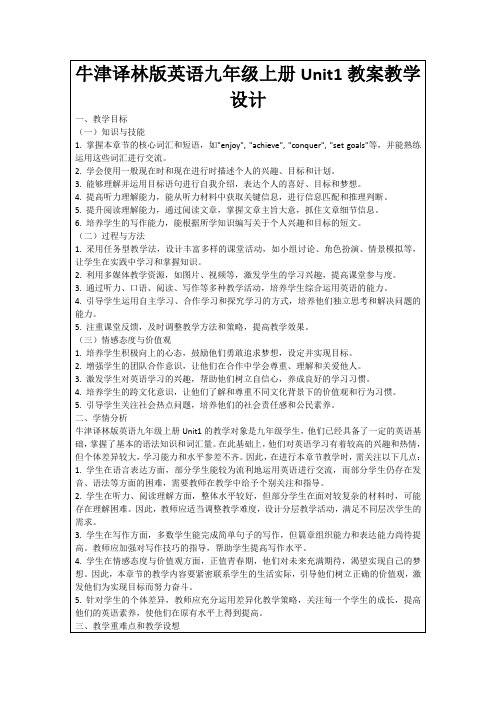
(一)教学重难点
1.重点:本章节的重点在于让学生掌握描述个人兴趣、目标和计划的词汇和句型,如“enjoy”, “achieve”, “My goal is to...”, “I am planning to...”等,并能运用这些语言进行表达和交流。
难点:听力部分的对话和短文理解,以及阅读部分的长篇文章理解和信息提取。学生对复杂句子结构的理解和听力技巧的运用存在一定难度。
4.学生在情感态度与价值观方面,正值青春期,他们对未来充满期待,渴望实现自己的梦想。因此,本章节的教学内容要紧密联系学生的生活实际,引导他们树立正确的价值观,激发他们为实现目标而努力奋斗。
5.针对学生的个体差异,教师应充分运用差异化教学策略,关注每一个学生的成长,提高他们的英语素养,使他们在原有水平上得到提高。
提交形式:线上提交词汇复习的截图或照片,以证明完成情况。
6.家庭作业:布置一份综合性的英语练习,涵盖本节课所学知识。练习内容包括:听力、阅读、写作和翻译等。
提交形式:纸质版作业,教师批改后进行课堂讲评。
二、学情分析
牛津译林版英语九年级上册Unit1的教学对象是九年级学生,他们已经具备了一定的英语基础,掌握了基本的语法知识和词汇量。在此基础上,他们对英语学习有着较高的兴趣和热情,但个体差异较大,学习能力和水平参差不齐。因此,在进行本章节教学时,需关注以下几点:
1.学生在语言表达方面,部分学生能较为流利地运用英语进行交流,而部分学生仍存在发音、语法等方面的困难,需要教师在教学中给予个别关注和指导。
2.教学活动:教师通过PPT展示本节课的词汇和句型,并结合实际生活例子进行讲解,让学生理解并掌握新知识。
3.例句展示:教师给出几个描述个人兴趣和目标的例句,让学生模仿并用自己的语言进行表达。
江苏省句容市行香中学九年级英语上册 Unit 1 Know yourself Intergrated skills教案 (新版)牛津版

Unit 1一、教学目标:1.掌握本课时的四会单词2.能够理解中国的12生肖和西方的12星座的含义并能够从所听材料中提取需要的信息。
3.通过学习、讨论能够辨别真伪,正确认识那些迷信的说法,并用积极向上的态度对待生活中遇到的挫折。
教学重点、难点: 如何能够准确地从听到的材料中提取需要的信息。
二、词汇、短语三、句型、要点1. Some people believe that people born under the same animal sign may have similar personalities.2. It is you who shape your life and your future.【课前导学】预习课文,完成下列句子:1. The Spring Festiva l is the l_______ New Year.2. This mark ___________(表示) a village.3. He has a _______(固定的) pattern of behaviour.4. I forgot to check my _______(日历) so I missed the concert.5. A rainbow _________(出现) in the sky after the heavy rain yesterday afternoon.6. How wonderful! It’s a much ________(生动的) concert than we expected.7. 据说,同一年出生的人可能有相似的个性。
_______________ that people born under the same animal sign may have similar personalities.【课堂学习】I. Lead-in: Ask and answer(1)When were you born?(2)What’s your animal sign?(3)Do you know how many animal signs the re are in China? What are they? II. Speak upA: What’s your animal sign?B: My ani mal sign is…… I’m a …boy/girl.What about you ?A: My animal sign is …,and I am …III. Pre-listening1.O rganize students to review the 12 animals’ names.2. Ask students what decides their Chinese lunar calendar and star sign. Ask themto discuss with their parters.3.Before playing the tape, Teacher can teach them some difficult words.While-listening1. Listen and choose:(1) What’s the personality of people born in The Year of the Dragon?A. carefulB. creative C powerful(2) what does your star sign depend on?A. date of birthB. year of birthC. time of birthpersonaliIt is _____( ) 2.A.same B.similar C.different( ) 3.A.animal signs B.star signs C.you3. Listen and fill in the blanks in Part A3.Post-listening1.Discuss: Do you believe the animal sign or the star sign decides yourpersonality?Why or why not?2.We need a new chairpersonIV. Key language points.1.他们每一个代表阴历的一年each of them represents a lunar year辨析: each/everyEach既可作代词也可以作形容词,但every只能作形容词。
人教版九年级英语Unit1 教案

人教版九年级英语Unit1 教案Unit 1: XXX learnerIn this unit。
we will learn how to study for a test and give advice to those who have difficulties in studying。
Our language goal is to understand key sentences and master the methods of learning English。
including the proper use of XXX。
Our nal goal is to develop students' reading XXX cultural awareness。
moral character。
XXX.Lesson 1: n A (1a-2d)Self-Study Guide:XXX following phrases:1.Make vocabulary cards2.XXX to the。
tape3.Ask XXX help4.Practice n loudly5.Collaborate in a group study6.Practice dialogue with XXX7.Go through each word8.Make a report9.Meaningful phrases10.Take it slow11.XXX skills12.English speaking skillsClass Guide:Step 1: n and Warm-upStart with a free talk for two minutes.Greetings to the students。
e back to school。
I am delighted to XXX to those who received good grades last term。
九年级英语上册Unit1教案

九年级英语上册Unit1教案一、教学目标1、语言知识目标学生能够掌握本单元的重点词汇,如:textbook, conversation, aloud, pronunciation 等。
学生能够熟练运用重点句型进行交流,如:How do you study for a test? I study by 等。
2、语言技能目标听:能够听懂关于学习方法的对话和短文。
说:能够用英语谈论自己的学习方法,并与他人交流学习经验。
读:能够读懂有关学习方法的文章,并获取关键信息。
写:能够用书面形式描述自己的学习方法和学习习惯。
3、情感态度目标培养学生积极主动的学习态度,鼓励学生寻找适合自己的学习方法。
让学生意识到合作学习的重要性,增强学生之间的交流与合作。
4、学习策略目标认知策略:引导学生总结归纳学习方法,培养自主学习能力。
调控策略:帮助学生制定学习计划,合理安排学习时间。
交际策略:鼓励学生积极参与课堂活动,与同学和老师进行有效的交流。
5、文化意识目标了解不同国家学生的学习方式和习惯,拓宽学生的国际视野。
二、教学重难点1、教学重点掌握本单元的重点词汇和句型。
学习并掌握 by + doing 的用法。
能够运用所学知识谈论学习方法。
2、教学难点如何引导学生用英语准确地表达自己的学习方法和经验。
培养学生的自主学习能力和合作学习意识。
三、教学方法1、任务型教学法通过设计各种任务,让学生在完成任务的过程中学习和运用语言知识。
2、情景教学法创设真实的语言情景,让学生在情景中感受和理解语言。
3、合作学习法组织学生进行小组合作学习,培养学生的合作意识和交流能力。
四、教学过程1、导入(Leadin)通过播放一段关于学生学习的视频或展示一些学生学习的图片,引入本单元的主题——学习方法。
提问学生:How do you usually study? 引导学生用简单的英语回答,如:I study by reading books 等。
2、词汇学习(Vocabulary Learning)展示本单元的重点词汇,如 textbook, conversation, aloud, pronunciation 等,通过图片、例句等方式帮助学生理解词义。
九年级英语上册第一单元教案

Unit 1 How do you study for a test【知识点】Section A1. How do you study for a test? 你怎样为考试做准备?2. by doing sth 通过做某事by1)通过…..方式(途径)。
例:I learn English by listening to tapes.2)在…..旁边。
例:by the window/the door3)乘坐交通工具例:by bus/car4)在……之前,到……为止。
例:by October在10月前5)被例:English is spoken by many people.6) 由于by mistake7) 连接one by one 一个接着一个3. ask sb. for help 向某人求助ask:1) ask sb to do sth .请某人做某事2) ask sb about sth .询问某人关于某事3) ask for sth4) ask sb for sth4. practice doing 练习做某事She often practice speaking English. 她经常练习说英语。
5. What/ how about +doing sth.? 做某事如何?6. aloud / loudly / loud1)aloud: 副词,强调发出的声音能被听见,意为“出声地”或“大声地”,常与read,call连用,无比较级和最高级He read the story aloud to his son.他朗读那篇故事给他儿子听。
2)loud意为“响亮地;大声地;高声地”,侧重发出的声音大,传得远,loud可作形容词或副词。
用作副词时,常与speak, talk, laugh等动词连用,多用于比较级,须放在动词之后。
如:She told us to speak a little louder. 她让我们说大声一点。
人教版九年级英语unit 1教案

Unit 1 How can we become good learners?教材解读本单元话题围绕学习本身,讲述了学习的障碍及对应的解决方法,对学生有重要意义。
Section A内容上侧重英语学习的方法,需要学生学习、训练相关语言内容及技能。
Section B则在谈论英语学习的基础上,在话题上,从英语的学习困难及解决方案,拓展到优秀学习者的学习习惯;在语言上,巩固了Section A 所学语言结构,丰富了与学习相关的话题词汇;在技能上,将听、说能力综合,突出阅读训练,由读促写;在策略上,引导学生关注优秀学生的学习方式,借鉴并用于自身;在情感上,鼓励学生直面学习困难,积极探索解决方案,不断改进自己的学习方法,提高学习效率。
单元目标一、知识与技能1.Talk about how to study. 学会讨论各种学习方法和策略。
2.Find out your suitable learning methods. 找出适合自己的学习方法。
3. 学会运用how来询问做事方式。
4. 学会运用by + doing的结构表达做事方式。
by 介词,表示“通过……方法或途径”,译成“靠、通过”。
by后面可以加名词或动名词短语。
5. 动名词的构成:动词后加动名词doing,相当于名词,在句子中可以做主语、宾语、表语定语等。
6. 掌握一些重点句型和短语。
二、过程与方法灵活运用教材,从所教学生的实际水平和语言能力出发,对教材内容进行整合,对教材做适当的修改和扩充,使内容更贴近生活,让学生有更多的发挥空间。
合理安排本单元的课时数,设计好每课时的教学内容。
三、情感、态度与价值观通过对学习方法的学习,培养学生用正确而科学的方法做事的能力,明白“一份耕耘,一份收获”。
教法导航1. 以任务型教学作为课堂教学理念、利用整体语言教学法、情景教学法、交际教学法等。
2. 在教学中创设切实可行的任务型教学活动、突出交际性。
3. 教师为主导、学生为主体、任务为基础,注重实用性。
人教版英语九年级全一册教案:Unit1SectionA(4a-4c)
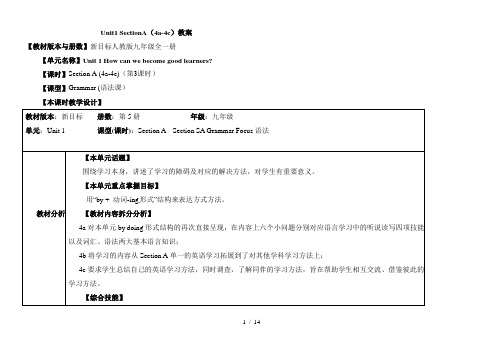
Unit1 SectionA(4a-4c)教案【教材版本与册数】新目标人教版九年级全一册【单元名称】Unit 1 How can we become good learners?【课时】Section A (4a-4c)(第3课时)【课型】Grammar (语法课)【本课时教学设计】教材版本:新目标册数:第5册年级:九年级单元:Unit 1 课型(课时):Section A Section SA Grammar Focus语法教材分析【本单元话题】围绕学习本身,讲述了学习的障碍及对应的解决方法,对学生有重要意义。
【本单元重点掌握目标】用“by + 动词-ing形式”结构来表达方式方法。
【教材内容拆分分析】4a对本单元by doing形式结构的再次直接呈现,在内容上六个小问题分别对应语言学习中的听说读写四项技能以及词汇、语法两大基本语言知识;4b将学习的内容从Section A单一的英语学习拓展到了对其他学科学习方法上;4c要求学生总结自己的英语学习方法,同时调查,了解同伴的学习方法,旨在帮助学生相互交流、借鉴彼此的学习方法。
【综合技能】1 / 142 / 14附:教学活动设计3 / 14/physics/chemistry?Do you learn history and geographyby________?学习兴趣DE LC5 2 获Step2Pre-Task(5 mins)Step 3While-TFind the new words and phrases重复,重做________物理__________化学___________记忆,记住________练习做某事_____________做笔记______句子模式_____________Answers:重复,重做----repeat物理___physics化学---chemistry记忆,记住---memorize练习做某事---practice doing sth做笔记---- take notes句子模式----sentence patterns为本节课语法任务的完成扫除障碍。
九年级英语外研版上册Module1-Unit1-优质课教案(天津市)

Module1 Unit1优质课教案
一、课堂学习效果自我评估表
二、课堂小组评价表
九.教学反思
在本节听说课中,我利用多媒体素材,穿插了音频文件、视频文件及一些世界奇观图片,还辅加以实物教具,如:世界奇观图片和书签,通过这些真实的影音图文介绍,直观形象地导入主题,生动地呈现了教学内容,在紧张有序地教学活动中,不断变换着花样进行语言项目的操练。
整堂课的教学过程,环环相扣,紧紧地抓住了学生的注意力,同学们在课堂教学活动中以小组活动为主线,结对或全班活动为辅,互相切磋、交流“Wonders of the world”,师生互动,生生互助,教师适时适度的鼓励和表扬,使学生感受到学习英语的乐趣及交流的意义,同时也培养了学生能够与他人合作,尊重他人的态度,倾听他人的不同意见。
总之,本节课在轻松愉快的英语学习氛围中,完成了教学任务,收到了很好的教学效果。
当然,这四十五分钟的课堂毕竟时间有限,在听力部分,由于时间问题,只播放二遍,对于那些基础差的学生来说,没能及时听懂对话,始终处于被动中, 回答。
人教版九年级英语上册 Unit 1 教案设计

Unit 1 Grammar FocusClass Type GrammarObjectives 1. To learn the structure “verb + by with gerund”.2. To better understand and express the structure well inpractice.Key 1. How do you learn English?structure —I learn English by studying with a group.2. Do you learn English by reading aloud?—Yes, I do.3. How can I read faster?—You can read faster by reading word groups.4. How can I improve my pronunciation?—One way is by listening to the tapes.Difficulties How to well describe the sentence structures “verb +by with gerund” in practice.repeat, note, physical, chemistry, memorizetake notes, pen palVocabularyPeriod 1ProcedureLead-in Read some sentences with “by…” underlined.Step 1 Explain “ by + 动名词”, and give some examples.Step 2 Answer some questions using the form “by…”.Step 3 Exercises.EarlybirdTranslate sentences into English.Step 4 Explain the uses of “by”,and give some examplesaccordingly.Step 5 Give comparisons about “by, in, with”.Step 6 More exercises.1. English and Chinese translations.2. Complete sentences with phrases of “by”.Unit 1 Section A-1Class Type Listening, reading and speakingObjectives 3. To learn the ways of studying English;4. To practice talking about the good ways of studying fora test.Key 1. How do you learn English?structure —I learn English by studying with a group.2. Have you ever studied with a group?— Yes, I have.Difficulties How to describe the ways of studying for a test andexpress the way to learn study English well.textbook, conversation, aloud, pronunciation,sentence, patientVocabulary make conversation with …, word by wordPeriod 1EarlybirdProcedureLead-in Enjoy a song : Lemon TreeStep 1 Free talk.Show Ss some pictures and then ask them to talk about:1. Do you like English?2. How do you study English?Step 2 List to Ss the ways of studying English in thediscussion.Step 3 Activity 1b.Listen and answer the questions with the proper letters from 1a.Step 4 Pair works.Ask Ss to ask your partner how he or she studies fora test by making a conversation.E.g.:A: How do you study for a test?B: I study by working with a group.Step 5 Free talk.1. Do you learn English by watching videos?2. Have you ever practiced English conversationswith friends?3. What about listening to English tapes?4. What about reading aloud to practicepronunciation?5. Have you ever studied English with a group?Step 6 Activity 2a.Listen and check the questions you hear.Step 7 Listen again and match the answer to the question.Step 8 Pair works.Let Ss make conversations in groups by using the information in 2a and 2b.EarlybirdE.g.:A: Have you ever studied with a group?B: Yes, I have. I’ve learned a lot that way.Step 9 Let Ss enjoy a video about how to learn English.Step 10 Activity 2d.Let Ss read the conversation between Jack and Annie and answer thequestions.Step 11 Free talk.1. Do you have good ways to learn English?2. How can you improve your speaking, listening,reading and writing in English?Step 12 Language points: explain the key words and phrasesin section A-1.Step 13 Let Ss do some exercises about the language points.Step 14 Brainstorm.Show Ss some interesting facts about Languages.Step 15 Let Ss read and remember some basic rules ofbecoming a good English learner.Unit 1 Section A-2Class Type ReadingObjectives 5. To learn the passage about “How I Learned to LearnEnglish”.6. To better understand the good ways of studying inthis passage.Key How I learned to learn English?structure —I learned useful sentences like “it’s a piece ofEarlybirdcake”.—I could get the meaning by the listening for justthe key words.Difficulties How to find out the ways of studying English andthen describe them well.expression, discover, secret, grammarlook upVocabularyPeriod 1ProcedureLead-in Revision.List the ways of learning English.Step 1 Free talk.1. Do you think it’s boring to study grammar?2. Which is the best way to study English?Step 2 Activity 3a.Read the passage about Wei Fen and answer the questions.Step 3 Read again.Let Ss decide the sentences are true or false.Step 4 Activity 3b.Complete the sentences with what Wei Fen learned from watching movies. Step 5 Free talk.Ask Ss to talk about the question:What is your secret to English learning?Step 6 Brainstorm.List to Ss some English learning tips.EarlybirdStep 7 Show Ss a picture about 4 ways to immediatelyimprove English communication skills.Step 8 Let Ss think and give out some proverbs aboutlearningStep 9 Show Ss some pictures about people of all ages’learning to make Ss think about their studies.Step 10 Exercises.Translate some sayings about learning.Step 11 Language points: explain the key words andphrases in section A-2.Unit 1 Section B-1Class Type Listening and speaking.Objectives 1. To know the difficult things in learning English.2. To find the solutions to solve the difficulties bylistening.3. To practice talking about the conversation. 1. What things aredifficult for you?Key—I can’t pronounce some of the words. structure—I don’t know how to increase my reading speed. 2. I don’t have apartner to practice English with. —Maybe you should join an English club.EarlybirdDifficulties How to find out and then solve the difficulties inlearning English.pronounce, increase, speed, partner make mistakesVocabularyPeriods 1ProcedureLead-in Revision.Give out the ways of studying English in the sentence: I studyEnglish by ….Step 1 Discussion.Let Ss talk about1. What things are difficult in learning English?2. Are there any difficulties else?Step 2 Free Talk.Ask Ss about their good advices for learning English.Step 3 Activity 1c.Listen and complete the learning challenges he talks about.Step 4 Activity 1d.Listen again. Complete the solutions.Step 5 Listen again.Fill the blank with what you have heard.Step 6 Pair works.Let Ss have some role-play conversations using the information from 1c and1d.E.g.:A: I don’t have a partner to practice English with.B: Maybe you should join an English club.Step 7 Language points: explain the key words andphrases in section B-1.EarlybirdStep 8 Examples and exercises about the language points.Unit 1 Section B-2Class Type Reading and writingObjectives 1. To understand the passage about the waysabout becoming a successful learner.2. To introduce to your friend about the best waysto learn English.1. How can you become a successful EnglishKeylearner?structure—By creating an interest in what they learn.2. If you are interested in something, your brain willbe more active …3. It is also a good idea to …because…Difficulties How to better understand the ways of learningEnglish well and put them into practical using.born, ability, create, brain, active, attention,connect, review, knowledge, wiselyVocabulary pay attention to, connect ... withPeriods 1ProcedureLead-in Enjoy a song: I believe I can fly.Step 1 Revision.Think about the difficult things and advice of learning English. Step 2 Free Talk.1. Do you think English is difficult or easy? Why?Earlybird2. How do you learn to learn English well?3. Do you have any learning habits?Step 3 Show some pictures of learning habits, talk aboutare those good or bad, and give out your reasons.Step 4 Activity 2b.Read the passage quickly and answer the question.Step 5 Activity 2c.Read again and find out the answers to the questions.Step 6 Free talk.Let Ss think about the other ways to become a successful learner. Step 7 Language points: explain the key words andphrases in section B-2.Step 8 Write a letter telling a friend how to become a betterlanguage learner.Step 9 Write an article about the things that have helpedyou the most in learning another language.Step 10 Writing.1. If you were Liu Mei, write a letter to your foreignteacher Mr. Brown about your discussion with yourfriend Allen.2. Write a letter to tell one of your friends how tobecome a better language learner after you have readthe article about how to learn English wellStep 11 Interview.Ask three classmates about learning English. Take notes and then tell theclass about their answers.Earlybird。
九年级上册Unit1教案

Read it loudly
Language points(patient ) and do e*ercises
反响
作业
必做题 recite 1a and 1b
选做题 read 2d in the book.
课后反思
课题
SectionA 3a-4c
理论
依据
依课标 五级词汇:chemistry pronoune increase speed parnter born
2. Familiar with this topic how to study English.
3. GradeA: make sentences use by doing sth.
GradeB: finish e*ercises in 4a.
GradeC: have a brief understanding of this passage.
A and B:
Make sentences by
Their own.
C:
Use the sentences given by PPT
Then ask three pairs to present.
Read P1
and answer
Why did Wei Fen dislike her English class"
by +doing sth.
教学
流程
surveynew phraseslisten and numberlisten and fill
Listen and repeatlisten and checklisten and match
Role -play
九年级Unit 1教案

Unit 1 How can we become good learners?Section A 1 (1a-2d)教学目标知识与技能:(1)熟练掌握下列词汇:aloud pronunciation discover repeat note(2)熟练掌握下列短语:work with friends ask the teacher for help(3)掌握下列句型:How do you study English? I learn by working with a group.过程与方法:1. Talk about how to study. 学会讨论各种学习方法和策略。
2. Find out your suitable learning methods. 找出适合自己的学习方法。
情感态度价值观:通过对学习方法的学习,培养学生用正确而科学的方法做事的能力,明白“一份耕耘,一份收获”。
重点、难点(Key points and difficulties)1. 学会运用how来询问做事方式2. 学会运用by + doing的结构表达做事方式。
by 介词,表示“通过……方法或途径”,译成“靠、通过”。
by后面可以加名词或动名词短语。
教学准备:准备本课时PPT教学过程Step 1 Warming upT: How do you study English? Do you study English by the following ways? (Showsome pictures and present the important phrases.)T: How do you study English?S: I study English by ______. by working with friends.......Step 2 1a Check the ways you study English. Then add other ways you sometimes study. Step 3 Listening1) Listen. How do these students study for a test? Write letters from 1a above.2) Check the answers: b (Meiping); e (Peter); d (Tony)Step 4 GuessShow some pictures.Guess: How does he/she study English? He/She studies English by…How do they study English? They study English by…Step 5 Pairwork1c Make conversations about how you study for a test.Step 6 Listening2a Listen and check the questions you hear.2b Listen again. Match each answer below with a question above.Step 7 Pairwork1. 2c Make conversations using the information in 2a and 2b. Show some pictures.2. 2c Role-play the conversation.Step 8 SummaryHow do you study English?1. by working with friends2. by watching English movies.3. by making word cards.Step 9 Language points1. I study by working with a group.我通过小组活动来学习。
人教版英语九年级上册Unit1SectionA1a-2d教案与反思

教案知人者智,自知者明。
《老子》
原创不容易,【关注】,不迷路!
【素材积累】
阿达尔切夫说过:“生活如同一根燃烧的火柴,当你四处巡视以确定自己的位置时,它已经燃完了。
”有选择就会有错误,有错误就会有遗恨,但即使第一步错了,只要及时地发现并纠正,未必步步都错下去。
峰回路转,柳暗花明,路断尘埃的时候,自己给自己一双翅膀;厄运突降的时候,自己给自己一个微笑;雨雪连绵的时候,自己给自己一份责任和梦想。
天下路都是相连的,沿着心中的路坚定地走下去,同样能抵达你想要去的地方。
Unit1 Topic3 SectionD教案 仁爱版九年级英语上册

九年级上册Unit 1 Topic 3 The world has changed for the better.Section D【教学构思】一、教材分析:本课属于课标话题人与社会——“周围的环境(Personal environment)”中国家与民族(Countries and nationalities)项目,主要介绍希望工程和它做出的贡献。
主要教学活动为1a和2,学生通过阅读了解希望工程和它做出的贡献,寻找主旨句,获取主要信息,培养“读”的语言能力。
运用所给词正确形式填写2的短文,了解Minmin被希望工程改变的命运,进一步感受希望工程的意义重大。
Section D第一个部分的内容,总结本话题所学语法和功能,在复习时发现学生存在的问题,及时解决问题。
二、设计说明:根据学情和本课的语法及话题,本节课的教学设计将说、读、写相结合,先复习本话题所学语法和功能,补缺补漏,融会贯通。
通过阅读1a和2的语篇,了解希望工程和它做出的贡献,获取主要信息,学习语言知识,培养“读”的语言能力。
本课在重、难点突破的方法上有所创新,教师通过竞赛方式复习本话题所学语言语法知识,既能引导学生有效复习,又能激发学生积极性和主动性。
课前搜集Project的信息,课上小组讨论并组织演讲介绍一个公益组织。
【教学目标】1. 复习本话题语法和功能,能够正确使用所学语法和功能,培养综合语言能力;2. 通过阅读把握语篇基本结构,寻找主旨句,培养“读”的语言能力;3. 通过小组活动,学会搜索和交流信息,组织语言做演讲,培养“说”的语言能力和思维品质。
【教学重难点】正确使用与since和for连用的现在完成时。
【教学方法】任务型教学法【教具】多媒体设备,教学课件【教学过程】Step 1. GreetingStep 2. Review1. Review the words and phrases in this topic by playing games.2. Review the grammar in this topic by doing some exercises and fill in the blanks of Grammar and Functions. Students can do the exercises through competition to see which group can complete the exercises fastest and most correctly.(设计意图:通过希沃设计竞赛和游戏方式,复习本话题语法和功能,既能帮助学生梳理记忆本课重点知识,及时补缺补漏,又能激发学生兴趣和积极性。
人教版九年级英语上册教案 Unit1 第1课时教案
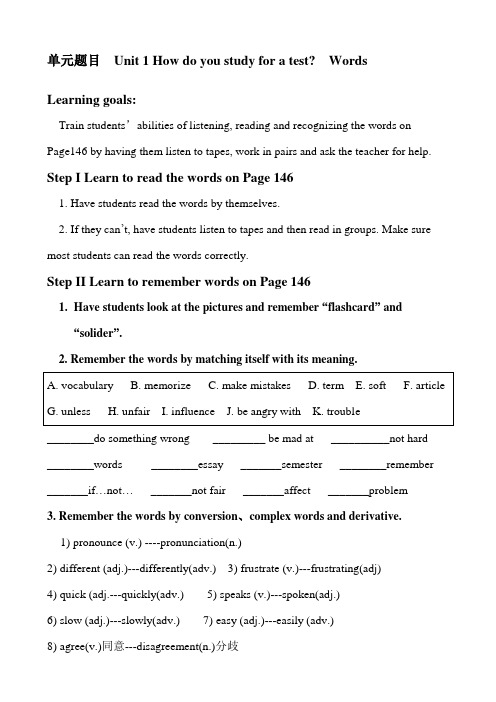
单元题目Unit 1 How do you study for a test? WordsLearning goals:Train students’abilities of listening, reading and recognizing the words on Page146 by having them listen to tapes, work in pairs and ask the teacher for help. Step I Learn to read the words on Page 1461. Have students read the words by themselves.2. If they can’t, have students listen to tapes and then read in groups. Make sure most students can read the words correctly.Step II Learn to remember words on Page 1461.Have students look at the pictures and remember “flashcard” and“solider”.2. Remember the words by matching itself with its meaning.________do something wrong _________ be mad at __________not hard ________words ________essay _______semester ________remember _______if…not…_______not fair _______affect _______problem3. Remember the words by conversion、complex words and derivative.1) pronounce (v.) ----pronunciation(n.)2) different (adj.)---differently(adv.) 3) frustrate (v.)---frustrating(adj)4) quick (adj.---quickly(adv.) 5) speaks (v.)---spoken(adj.)6) slow (adj.)---slowly(adv.) 7) easy (adj.)---easily (adv.)8) agree(v.)同意---disagreement(n.)分歧9) important (adj)重要的---unimportant(adj)不重要的10). Friend n.)朋友---friendship(n.)友情11) fair (adj.公平的---unfair(adj.)不公平的Step III Consolidation of words1.Have students check if they remember all the words by working in pairsand check each other.2.If they can’t, they can open the books and read them again. Then dictatethem in the exercise by themselves.Step IV Read and translate the storyEnglish is widely used in the world. Many people regard English learning as an important part of their development. I try my best to find good solutions to deal with the problem. Now I have some specific suggestions.First, we must have active attitude. We shouldn’t be afraid to make mistakes and be laughed at. We should face the challenges just like a soldier.Then, we must have some good ways of learning English. Here are some ways.To be a good language learner, we must get our pronunciation right. Listening to tapes and watching videos can help us a lot. Maybe at first we can’t understand the speakers because they speak too quickly. But it doesn’t matter. Go on with it and try to follow them. Later on, you can pronounce the words well. Another secret is that we can read aloud to practice spoken English.V ocabulary is another challenge. My teacher offers me some help. She tells me that memorizing new words is not so frustrating as I think. She adds that making vocabulary lists and flashcards may impress me very much and reading textbooks isalso a great idea.Grammar is language rules. It’s very important. First of all, we must know the rules well by taking notes. Then, we can make up stories and make complete sentences to practice them.Besides all the good ways, I realize that I won’t succeed unless I word hard. Step V 画思维树,必须画Step VI当堂检测一.按要求写出下列单词。
人教版九年级英语上册 Unit 1 教案

Unit 1 How can we become good learners?学习目标认知目标:1. Talk about how to study. 学会讨论各种学习方法和策略。
2. Find out your suitable learning methods. 找出适合自己的学习方法。
情感目标:通过对学习方法的学习,培养学生用正确而科学的方法做事的能力,明白“一份耕耘,一份收获”。
技能目标:(1)熟练掌握下列词汇:textbook conversation aloud pronunciation sentence patient expression discover secret grammar repeat note pal physics chemistry memorize pattern pronounce increase speed partner born ability create brain active attention connect overview review knowledge lifelong wisely(2)熟练掌握下列短语:work with friends ask the teacher for help read aloud look up be born with practice pronunciation connect…with… p ay attention to(3)掌握下列句型:How do you study English?I learn by working with a group.Do you learn English by reading aloud?Yes, I do. It helps my pronunciation.How can I read faster?You can read faster by reading word groups.How can I improve my pronunciation?One way is by listening to tapes.But whether or not you can do this well depends on your learning habits.重点、难点(Key points and difficulties)1. 学会运用how来询问做事方式2. 学会运用by + doing的结构表达做事方式。
新牛津译林版九年级英语上册教案Unit 1第一课时
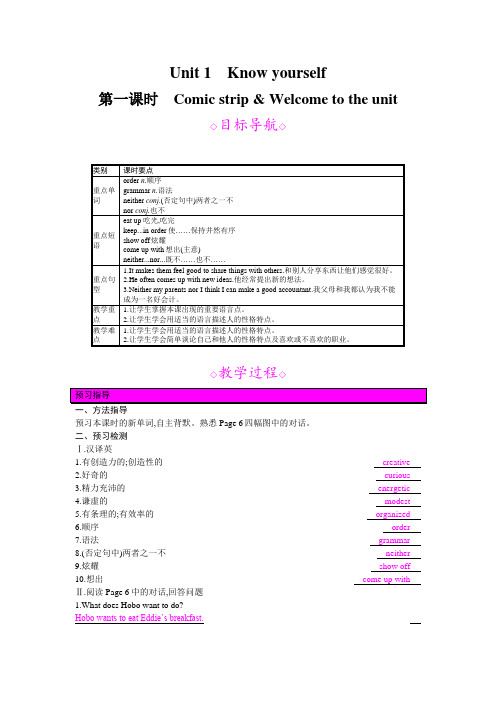
Unit 1Know yourself第一课时Comic strip & Welcome to the unit◇目标导航◇◇教学过程◇一、方法指导预习本课时的新单词,自主背默。
熟悉Page 6四幅图中的对话。
二、预习检测Ⅰ.汉译英1.有创造力的;创造性的creative2.好奇的curious3.精力充沛的energetic4.谦虚的modest5.有条理的;有效率的organized6.顺序order7.语法grammar8.(否定句中)两者之一不neither9.炫耀show off10.想出come up with Ⅱ.阅读Page 6中的对话,回答问题1.What does Hobo want to do?Hobo wants to eat Eddie’s breakfast.2.Is Eddie happy?Why?No.Because Hobo has eaten up his breakfast.Step1情景导入Teacher:Hello,everybody!We haven’t seen each other for a long time.Were you happy in summer holidays?Did you have a good time?Where did you go?What did you do?What did you eat?What food is your favourite?Step2完成教材Comic strip的任务1.让学生听录音,熟悉漫画的内容。
2.引导学生观察Page 6中的四幅漫画,回答下面的几个问题。
(1)What is the interesting dialogue about?It is about personality.(2)What makes generous people feel good?It makes them feel good to share things with others.(3)What happens to Eddie’s breakfast in the end?Hobo has eaten it up.3.让学生听录音,熟读漫画中对话的内容。
仁爱版九年级英语上册Unit1Topic3SectionB教案

仁爱版九年级英语上册Unit1Topic3SectionB教案Unit 1 The Changing WorldTopic 3 Section B教案Teaching aims and demands1. Learn some new words: rope, retell, discover, invention2. Talk about New York's city life in the past and now.(1) I heard the traffic there was terrible and everyone drove too fast.(2) I also heard the streets were dirty.(3) I think it's a wonderful place to live in.3. Pay attention to direct and indirect speech.4. Learn about word formation: derivationsdisobey discover impossible importantpeaceful useful exciting interestingTeaching aids⼩⿊板/多媒体/⼏张新旧北京图⽚/录⾳机Teaching PlanStep 1 Review1.教师播放"找朋友"的乐曲,四个⼩组展开竞赛复习合成词。
)T: Yesterday I told you to find out more compounds. This lesson we will have a word competition. Each group chooses one student to write the words you prepared on the blackboard. Other students in your group can come to the front and add. The group that has written the most words is the winner. (每组选择⼀⼈到⿊板上写出本组总结的合成词,其他同学可以补充,写的最多的组获胜。
人教版九年级英语全册Unit1单元教学设计
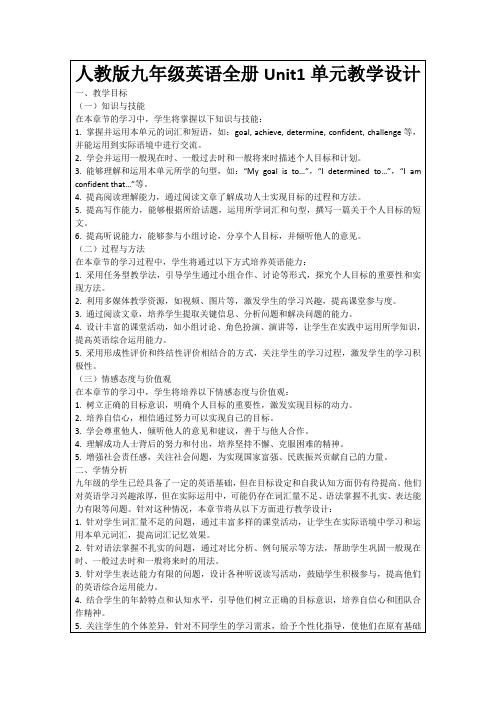
2.培养自信心,相信通过努力可以实现自己的目标。
3.学会尊重他人,倾听他人的意见和建议,善于与他人合作。
4.理解成功人士背后的努力和付出,培养坚持不懈、克服困难的精神。
5.增强社会责任感,关注社会问题,为实现国家富强、民族振兴贡献自己的力量。
3.教师选取部分学生的作业进行展示和讲评,指出优点和不足,引导学生相互学习。
4.针对学生的共性问题,教师进行集中讲解,确保学生掌握所学知识。
5.学生进行小组合作,完成一篇关于个人目标的短文,提高写作能力。
(五)总结归纳(500字)
1.教师引导学生回顾本节课所学内容,包括词汇、语法、阅读和写作等方面的知识。
6.提高听说能力,能够参与小组讨论,分享个人目标,并倾听他人的意见。
(二)过程与方法
在本章节的学习过程中,学生将通过以下方式培养英语能力:
1.采用任务型教学法,引导学生通过小组合作、讨论等形式,探究个人目标的重要性和实现方法。
2.利用多媒体教学资源,如视频、图片等,激发学生的学习兴趣,提高课堂参与度。
4.教师引导学生关注他人目标,学会尊重和倾听,同时鼓励学生提出建议和意见。
5.教师总结讨论成果,强调设定目标的重要性,激发学生实现目标的动力。
(四)课堂练习(500字)
1.教师设计一系列课堂练习,包括词汇填空、语法改错、阅读理解等,让学生巩固所学知识。
2.学生独立完成练习,教师巡回指导,解答学生的疑问。
2.教师通过例句展示,让学生掌握一般现在时、一般过去时和一般将来时的用法,并引导学生进行口头练习。
3.教师带领学生学习课文,通过略读、寻读等策略,获取文章大意,并关注文章中的重点句子和表达方式。
- 1、下载文档前请自行甄别文档内容的完整性,平台不提供额外的编辑、内容补充、找答案等附加服务。
- 2、"仅部分预览"的文档,不可在线预览部分如存在完整性等问题,可反馈申请退款(可完整预览的文档不适用该条件!)。
- 3、如文档侵犯您的权益,请联系客服反馈,我们会尽快为您处理(人工客服工作时间:9:00-18:30)。
九上Unit1教学要点【重要词汇概览】1. frustrating a. 令人沮丧的2. memorize v. 记忆,背诵3. pronunciation n. 发音4. flashcard n.认卡5. solution n. 解决办法6. not at all 根本(不)全然(不)7. end up 结束,告…终8. laugh at sb. 笑话;取笑(某人)9. take notes 做笔记,做记录doing sth. 喜欢做…乐意做…【知识点讲解】1.because)(1)I think I can study English by watching English movies because I like watching English movies.我认为我可以通过英语电影来来学英语,因为我喜欢看电影。
(2)I don’t think I can get an English tutor because I want to learn by myself at home.我不想上英语辅导,因为我想在家自学(3)I think surfing the internet is a bad way because you have to use a computer and always waste your time. 我认为沉溺于网络是不好的,因为你不得不去使用电脑和浪费你的时间2.【语法知识聚焦】By是个很常用的介词(有时也用作副词),在初中英语中的用法有以下几种:(1)意为“在……旁”、“靠近”。
如:有的在大树下唱歌跳舞,有的在湖边画画儿。
Some are singing and dancing under a big tree . Some are drawing by the lake.(2)意为“不迟于”、“到……时为止”。
如:Your son will be all right by supper time. 你的儿子在晚饭前会好的。
How many English songs had you learned by the end of last term?到上个学期末你们已经学了多少首英语歌曲?(3)表示方法、手段,可译作“靠”、“用”、“凭借”、“通过”、“乘坐”等。
如:The monkey was hanging from the tree by his tail and laughing.猴子用尾巴吊在树上哈哈大笑。
The boy’s father was so thankful that he taught Edison how to send messages by railway telegraph.孩子的父亲是那么的感激,于是他教爱迪生怎样通过铁路电报来传达信息。
(4)表示“逐个”、“逐批”的意思。
如:One by one they went past the table in the dark. 他们一个一个得在黑暗中经过这张桌子。
(5)表示“根据”、“按照”的意思。
如: What time is it by your watch? 你的表几点了?(6)和take , hold等动词连用,说明接触身体的某一部分。
如:I took him by the hand. 我拉住了它的手。
(7)用于被动句中,表示行为主体,常译作“被”、“由”等。
如: English is spoken by many people. 英语被许多人所说。
(即“许多人讲英语。
”)(8)组成其它短语。
1) by the way : 意为“顺便说”、“顺便问一下”,常做插入语。
如:By the way , where’s Li Ping , do you know? 顺便问一下,李平在哪儿。
你知道吗?2) by oneself : 意为“单独”、“自行”。
如:I can’t leave her by herself. 我不能把她单独留下。
3) by and by : 意为“不久以后”、“不一会儿”。
如:But by and by , more and more people began to study English.但是不久以后,越来越多的人开始学英语了。
二、动名词的构成动词后加动名词doing,相当于名词,在句子中可以做主语、宾语、表语定语等。
1)作主语 Fighting broke out between the South and the North. 南方与北方开战了。
2)作宾语(请问你介意调小一点收音机的音量吗?)Would you mind turning down your radio a little, please?3)作表语(保姆的工作是洗衣服,作饭和照看孩子。
)Babysister’s job is washing,cooking and taking care of the children。
练习:一. Match the questions and answers1. Have you ever worked with flashcards?2. Do you ever ask the teacher for help in yourEnglish class?3. Do you like to work in a group?4. Does reading aloud help you?5. Do you like to study grammar?6. What helps you study for a test?a. No, grammar is too boring.b. Yes, reading aloud helps my pronunciation.c. Yes, but I didn’t like them.d. Yes, the teacher is helpful.e. I think watching English-language TV helps mestudy.F. No, I don’t. Why would working in a group help?二. Close testTime spent in a bookshop can be enjoyable. If you go to a 1 shop, no assistant (营业员) will come near to you and say, “Can I help you?” You 2 buy anything you don’t want. You may try to find out 3 the book you want is . But if you fail, the assistant will lead (引导) you there and then he will go away. It seems that he is 4 selling any books at all.There is a story which tells us about a good shop. A medical (医学的) student 5 a very useful book in the shop, 6 it was too expensive for him to buy. He couldn’t get it from the library, either. So every afternoon, he went there to read 7 at a time. One day, however (然而), he couldn’t find 8 from its usual place and was leaving when he saw an assistant signing (示意) to him. To his surprise, the assistant pointed to the book 9 , “I put it there so as not to be sold out.” Said the assistant. Then he 10 the student to go on with his reading.1. A. good B. bad C. cheap D. expensive2. A. sho uldn’t B. needn’t C. mustn’t D.can’t3. A. what B. which C. where D. when4. A. surprised at B. not surprised at C. interested in D. notinterested in5. A. bought B. found C. read D. took6. A. but B. and C. so D. or7. A. little B. a little C. few D. a few8. A. the book B. the shop C. the assistant D. the shopkeeper9. A. in a bookshop B. in his hand C. in a corner D. in his pocket10. A. left B. let C. helped D. taught三.Reading comprehensionLet children learn to judge (判断) their own work. When children learn to speak, other people do not correct (纠正) their mistakes all the time. If we correct too much, they will stop speaking. Let themselves understand the difference between the language they speak and the language other people around them speak. Day after day, they will make some changes to make their language like other people's language. In the same way, children can learn to do many other things without others' help. For example, to walk, run, climb, and ride a bike-make themselves understand how they should do it. Slowly they can make some changes they need.But in school we never let a child himself find out his mistakes and correct them for himself. We usually think he never knows his mistakes if we do not tell him or he never corrects them if we do not make him do it. We should try to let him find out the answers to the problems, and the good ways of working them out with the help of other children if he wants.Can teachers give the students answer books if they do maths problems?Let them correct their homework all by themselves. When the students tell their teachers that they can't find the ways to get the right answers, the teachers should help them. Let the students know what they must learn, how to judge their own understanding (理解力), how to know what they know or what they do not know. These are the most important.(1).they text tells us that the children should learn things by(通过) _______.to other peoplewhat other people domistakes and then correcting themother people many questions(2).Which of the following is right? The teachers _______.give the students answers't let the students make mistakes't always correct the students' mistakes when they make mistakesgive the students the answers when they do problems(3).The writer thinks the teachers in school should _______.the students help each otherthe students less good waysmore of their homeworkthe students more book knowledge(4).This text shows that learning to speak is _______.Adifferent from learning other thingsvery important thingimportant than learning other thingslike learning other things答案及解析:一.cefbad二.1)选A,看下文可知与价格无关,排除C、D。
